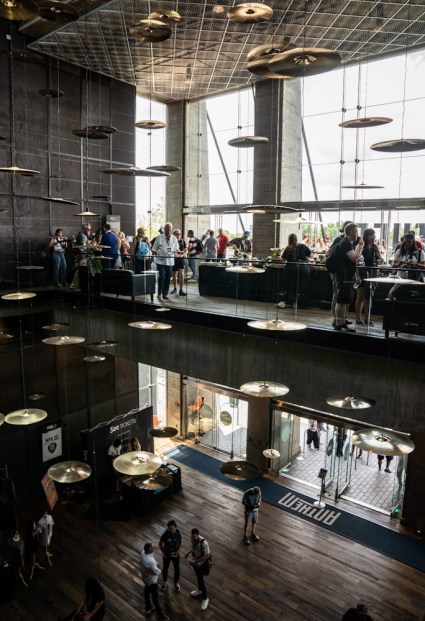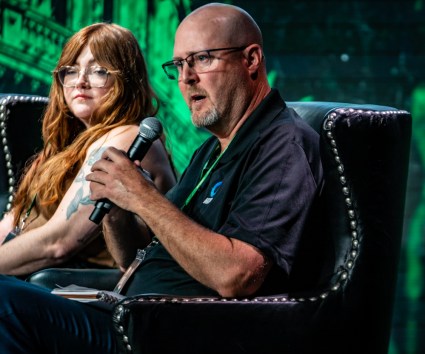
From July 10–12, the National Independent Venue Association (NIVA) presented NIVA ‘23, the leading conference for independent music and comedy venues, festivals, and the promotion industry. Members gathered in Washington, DC across venues around the city to meet and discuss topics of interest to independent venues, including industry diversity, mental health, safety, insurance, the economic impact of live entertainment, and the relationship between live entertainment and policy issues. On July 12, NIVA members also engaged with partners on Capitol Hill on issues relevant to the live entertainment industry during the first-ever Congressional fly-in on Capitol Hill before closing out the conference at a closing night party at the Black Cat.
NIVA is a relatively new organization, forming in April 2020, only three weeks into the pandemic shutdown. The immediate goal was to help save independent venues crippled by the effects of the global pandemic. It now represents independent music and comedy venues, festivals, performing arts centers, and promoters throughout the US. NIVA led efforts leading to the passage of the Save Our Stages Act, which secured $16 billion in federal relief funds, the largest amount allocated to the arts in U.S. history.

In 2023, NIVA’s formal mission is to “preserve and nurture the ecosystem of independent live venues, promoters, and festivals throughout the United States.” The first conference was held in Cleveland, Ohio last year. While about 500 attendees gathered in Cleveland, almost twice that number was expected in DC.
The festivities began Sunday night, at an opening night party at DC’s famed 9:30 Club and neighboring Atlantis, the city’s newest music venue, built as a replica of the original 9:30 Club on F Street in downtown DC. Attendees enjoyed food and drink while brass from See Tickets (the evening’s sponsor) and NIVA gave brief, informal opening remarks to the still-gathering crowd.
While eating, drinking, and networking went on at the 9:30 Club, Rudy Love the & the Encore and Elise Trouw were the opening night performers next door at The Atlantis, Washington, DC’s newest venue. Rudy Love & the Encore, hailing from Wichita, Kansas, are a collective made up band leader Love’s friends and family. For about an hour they energized the intimate crowd with their blend of R&B and soul.
Before taking the stage herself, Elise Trouw joined Love for a fun mashup of the White Stripes’ “Seven Nation Army” and Eurythmics “Sweet Dreams (Are Made of This).” She then put on a fantastic one-woman set. The jazz/pop singer songwriter moved easily between multiple instruments, drums, synths, and guitars while captivating the crowd with her gorgeous vocals.
The very busy, first official day of the conference kicked off Monday morning at The Anthem, arguably the jewel in owner I.M.P’s crown, with a gorgeous rendition of “The Star-Spangled Banner” on cello. Still-groggy attendees downed coffee and other refreshments while listening to introductory remarks by NIVA executive director Stephen Parker. The crowd got up and cheered for Dayna Frank, CEO of First Avenue & the 7th Street, and Co-Founder and first Board President of NIVA, who expressed her gratitude to NIVA members before handing the reins over to new Board President Andre Perry, who is currently executive director of Hancher Auditorium and the Office of Performing Arts and Engagement at the University of Iowa.

Perry gave thoughtful remarks, reflecting on his younger years in Washington, DC and how that influenced the ethos he brought with him to Iowa. He set the tone early in the conference, that while DC is known as a government town, it also has a big music scene, statements echoed later by Washington, DC Mayor Muriel Bowser when she appeared to welcome NIVA to the “greatest city in the world.”
Programming got underway with fireside chats with indie duo Matt and Kim, then jazz great and multi-Grammy Award-winning Christian McBride. The chats addressed questions about what venues could do to serve artists better. “Be present” was the general answer in a figurative sense but also a literal one, by making sure, for example, that the venue is available for artists to use the facilities upon arrival and providing agreed-upon help. Concerns were raised about increased ticket prices and the risk of excluding fans from live music culture; the fear that the youngest among us will not be able to afford live music. The concerns about live entertainment accessibility and industry sustainability were a thematic thread over the two days of NIVA programming.
Union Stage, a short walk from The Anthem, hosted panels addressing advocacy for the future of entertainment and the arts, the broad discussion of issues affecting artists as well as the industry workforce. If the arts are “what got us out of our COVID caves,” how do we nurture artists, in particular, up-and-coming artists? In general, the goal is to empower creators, make sure they have the tools they need, and ensure they get paid. Hopes were expressed that artificial intelligence will eventually be seen as a tool to support human creativity rather than replace it.
For this observer, the panel discussion on predatory ticketing practices—Fix the Tix—was a highlight of the day. “Fix the Tix” refers to, according to NIVA, a broad coalition of live event industry organizations and professionals formed to collectively advocate for a better ticketing experience for fans and artists.

Moderated by Rolling Stone’s Ethan Millman, the discussion centered around economic and other issues related to ticket prices and the secondary market, specifically ticket brokers. As Millman frequently pointed out, the persistent question is about where to find a balance. Pricing tickets at their full market value, the panelists stated, is not actually the way to build a sustainable career for artists, and artists are not necessarily motivated by making the most money. There are issues of cultural equity and accessibility in play as well. However, underpricing tickets makes room for the rent-seeking behavior demonstrated by ticket brokers currently observed in the market.
So, where does the industry find a sweet spot? Fix the Tix states that promoters and artists should be able to put terms and conditions on the resale of tickets. Putting the genie back in the bottle involves regaining control of the tickets, while still allowing the consumer to have some flexibility so that ticket buying doesn’t become a scary experience.
After a full day of programming that also touched on the role of festivals in building community and fostering innovation, as well as NPR’s role in discovering talent, the long night of entertainment and socializing got underway with the NIVA Awards Gala. DC’s JoGo Project, an award-winning jazz and go-go fusion band provided entertainment. Attendees mostly mingled while awards were handed out for diversity and inclusion, mentoring, advocacy and policy issues. It’s worth noting that both a Democratic State Representative, Bob Nosse of Oregon, and Texas Music Office Director Brendon Anthony, who serves under a Republican governor, received awards for their policy work. It underscores the idea that issues related to live entertainment are bipartisan.
Black Alley closed out the awards program at The Anthem, but the partying lasted late into the night, with after-party shows at Pearl Street Warehouse, where mingling went on while The Vegabonds and Tall Tall Trees provided music. I opted for the underground confines of Union Stage, where Iceland Music sponsored a show featuring Icelandic singer-songwriters JFDR and Júníus Meyvant. It was after midnight when I finally ran out of steam and went home.
Day two of NIVA ‘23 took place at Capital Turnaround, in the Navy Yard area of SW DC. Given the late-night parties Monday, it was great to see so many attendees already at the venue Tuesday morning, ready to take in the programming and socializing for the day. The day’s programming hit on many issues, from workforce development, issues facing non-profits, and the impact of small venues. There was a panel on artificial intelligence and a prep session for attendees participating in the Capitol Hill fly-in on Wednesday. For me, two sessions stood out as the major highlights of Tuesday.

The first was the fireside chat with US Representative Maxwell Frost, who represents the 10th District of Florida, an area that includes Orlando, and is the first member of Generation Z to serve in Congress. Along with the issues of housing/transportation and gun violence, Rep. Frost stated that the third major policy interest of his is arts and culture. Being from Orlando, Florida, he knows how much of a game changer live entertainment can be for a region.
The conversation explored the intersection of government and live entertainment and live entertainment venues’ role in creating a sense of community, especially in rural areas. While ticket pricing once again came up, Rep. Frost also mentioned his efforts to encourage the Department of Homeland Security to reconsider increasing its fees for visas obtained by foreign artists to tour and perform in the US, again touching on the of role in maintaining accessibility in the arts.
The other major highlight was the afternoon panel session on safety and security for venues. In 2023, safety issues are top of mind and continue to evolve for the live entertainment world. Topics in this space include government and law enforcement issues, insurance/risk management, sexual violence, and drug use, specifically risks related to fentanyl. The need for regulatory modernization was highlighted, as well as the usefulness of threat and vulnerability assessments for venues.
While prevention can seem daunting, the panelists stated that it doesn’t have to be costly—de-escalation training can help keep situations from getting out of control, keeping Narcan on hand can save lives, and vulnerability assessments and venue walk-throughs can prevent falls and slips, stated to be the most frequent type of insurance claim in this industry. Finally, a quick PSA by the venue before the opening act at a gig, where a venue representative points out all exits in the building to attendees, not just the main doors, could save lives in case tragedy strikes, an all-too-real possibility in 2023.
Another day of programming wrapped up with several parties across venues in the District of Columbia. I opted to head straight to Songbyrd, in DC’s Union Market district, where I caught DC go-go outfit Mambo Sauce before needing to call it a night.
There was no programming on Day 3; rather, NIVA conducted its first-ever Congressional fly-in, where NIVA members engaged with partners on Capitol Hill on issues important to live entertainment. The closing night party took place at the legendary Black Cat. By Wednesday night, the partying had slowed down a bit, but the Black Cat was still lively as those with stamina gathered one last time to celebrate a successful conference. NIVA attendees danced and hung out while listening to brief sets by Breezy Supreme, The Owners, Dim Wizard, and Ex Hex before heading their separate ways.
NIVA ’23 OPENING NIGHT















NIVA ’23 DAY ONE













































NIVA ’23 DAY TWO






















NIVA ’23 CLOSING NIGHT








































